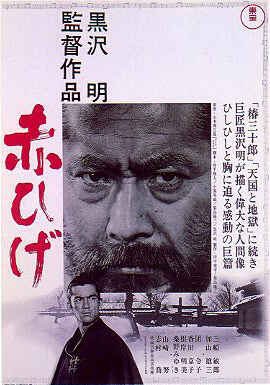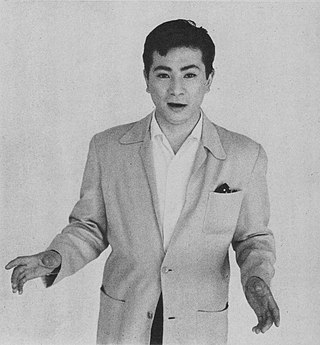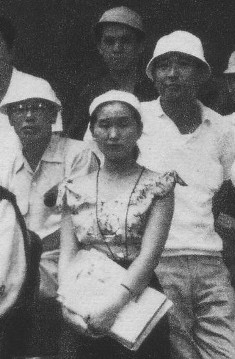
Akira Kurosawa was a Japanese filmmaker and painter who directed 30 films in a career spanning over five decades. He is widely regarded as one of the greatest and most influential filmmakers in the history of cinema. Kurosawa displayed a bold, dynamic style, strongly influenced by Western cinema yet distinct from it; he was involved with all aspects of film production.

The cinema of Japan, also known domestically as hōga, has a history that spans more than 100 years. Japan has one of the oldest and largest film industries in the world; as of 2021, it was the fourth largest by number of feature films produced. In 2011, Japan produced 411 feature films that earned 54.9% of a box office total of US$2.338 billion. Films have been produced in Japan since 1897, when the first foreign cameramen arrived.

Masaki Kobayashi was a Japanese film director and screenwriter, best known for the epic trilogy The Human Condition (1959–1961), the samurai films Harakiri (1962) and Samurai Rebellion (1967), and the horror anthology Kwaidan (1964). Senses of Cinema described him as "one of the finest depicters of Japanese society in the 1950s and 1960s."

Seven Samurai is a 1954 Japanese epic samurai film co-written, edited, and directed by Akira Kurosawa. Taking place in 1586 in the Sengoku period of Japanese history, it follows the story of a village of desperate farmers who seek to hire samurai to combat bandits who will return after the harvest to steal their crops.

Throne of Blood is a 1957 Japanese jidaigeki film co-written, produced, edited, and directed by Akira Kurosawa, with special effects by Eiji Tsuburaya. The film transposes the plot of William Shakespeare's play Macbeth from Medieval Scotland to feudal Japan, with stylistic elements drawn from Noh drama. The film stars Toshiro Mifune and Isuzu Yamada in the lead roles, modelled on the characters Macbeth and Lady Macbeth.

Toshiro Mifune was a Japanese actor and producer. A winner of numerous awards and accolades over a lengthy career, Mifune is best known for starring in Akira Kurosawa's critically-acclaimed jidaigeki films such as Rashomon (1950), Seven Samurai (1954), Throne of Blood (1957), The Hidden Fortress (1958) and Yojimbo (1961). He also portrayed Miyamoto Musashi in Hiroshi Inagaki's Samurai Trilogy (1954–1956), Lord Toranaga in the NBC television miniseries Shōgun, and Admiral Isoroku Yamamoto in three different films. He is widely considered one of the greatest actors of all time.

Rashomon is a 1950 Jidaigeki drama film directed and written by Akira Kurosawa, working in close collaboration with cinematographer Kazuo Miyagawa. Starring Toshiro Mifune, Machiko Kyō, Masayuki Mori, and Takashi Shimura as various people who describe how a samurai was murdered in a forest, the plot and characters are based upon Ryunosuke Akutagawa's short story "In a Grove", with the title and framing story being based on "Rashōmon", another short story by Akutagawa. Every element is largely identical, from the murdered samurai speaking through a Shinto psychic to the bandit in the forest, the monk, the assault of the wife and the dishonest retelling of the events in which everyone shows their ideal self by lying.

Red Beard is a 1965 Japanese jidaigeki film co-written, edited, and directed by Akira Kurosawa, in his last collaboration with actor Toshiro Mifune. Based on Shūgorō Yamamoto's 1959 short story collection, Akahige Shinryōtan, the film takes place in Koishikawa, a district of Edo, towards the end of the Tokugawa period, and is about the relationship between a town doctor and his new trainee. Fyodor Dostoevsky's novel Humiliated and Insulted provided the source for a subplot about a young girl, Otoyo, who is rescued from a brothel.

Dreams is a 1990 magical realist anthology film of eight vignettes written and directed by Akira Kurosawa, starring Akira Terao, Martin Scorsese, Chishū Ryū, Mieko Harada and Mitsuko Baisho. It was inspired by actual recurring dreams that Kurosawa said he had repeatedly. It was his first film in 45 years in which he was the sole author of the screenplay. An international co-production of Japan and the United States, Dreams was made five years after Ran, with assistance from George Lucas and Steven Spielberg, and funded by Warner Bros. The film was screened out of competition at the 1990 Cannes Film Festival, and has consistently received positive reviews.

The Hidden Fortress is a 1958 Japanese jidaigeki adventure film directed by Akira Kurosawa, with special effects by Eiji Tsuburaya. It tells the story of two peasants who agree to escort a man and a woman across enemy lines in return for gold without knowing that he is a general and the woman is a princess. The film stars Toshiro Mifune as General Makabe Rokurōta and Misa Uehara as Princess Yuki while the peasants, Tahei and Matashichi, are portrayed by Minoru Chiaki and Kamatari Fujiwara respectively.

Ikiru is a 1952 Japanese drama film directed and co-written by Akira Kurosawa. The film examines the struggles of a terminally ill Tokyo bureaucrat and his final quest for meaning. The screenplay was partly inspired by Leo Tolstoy's 1886 novella The Death of Ivan Ilyich.

Shintaro Katsu was a Japanese actor, singer, and filmmaker. He is known for starring in the Akumyo series, the Hoodlum Soldier series, and the Zatoichi series.

Kamatari Fujiwara was a Japanese stage and film actor who appeared in over 200 films between 1933 and 1984. In addition to regular appearances in the films of Akira Kurosawa, he worked for directors such as Mikio Naruse, Yasujirō Ozu, Heinosuke Gosho and others.

Dodes'ka-den is a 1970 Japanese drama film directed by Akira Kurosawa. The film stars Yoshitaka Zushi, Kin Sugai, Toshiyuki Tonomura, and Shinsuke Minami. It is based on Shūgorō Yamamoto's 1962 novel A City Without Seasons and is about a group of homeless people living in poverty on the outskirts of Tokyo.

Donald Richie was an American-born author who wrote about the Japanese people, the culture of Japan, and especially Japanese cinema. Although he considered himself primarily a film historian, Richie also directed a number of experimental films, the first when he was seventeen.

No Regrets for Our Youth is a 1946 Japanese film written and directed by Akira Kurosawa. It is based on the 1933 Takigawa incident, and is considered a quintessential "democratization film", taking up many themes associated with social policy under the early Occupation of Japan.

The Lower Depths is a 1957 Japanese film directed by Akira Kurosawa, the screenplay by Hideo Oguni and Akira Kurosawa, based on the 1902 play The Lower Depths by Maxim Gorky. The setting was changed for the film from late 19th-century Russia to Edo period Japan.

The legacy of filmmaking technique left by Akira Kurosawa (1910–1998) for subsequent generations of filmmakers has been diverse and of international influence beyond his native Japan. The legacy of influence has ranged from working methods, influence on style, and selection and adaptation of themes in cinema. Kurosawa's working method was oriented toward extensive involvement with numerous aspects of film production. He was also an effective screenwriter who would work in close contact with his writers very early in the production cycle to ensure high quality in the scripts which would be used for his films.

Teruyo Nogami is a Japanese film script supervisor and author. She is best known for her work on many of Akira Kurosawa's films, a partnership that began in 1950.
















